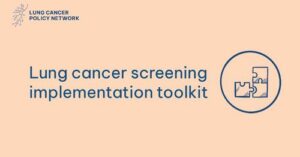
The Lung Cancer Policy Network has published A framework to support the implementation of LDCT lung cancer screening, which takes a health systems approach to enable a robust assessment of readiness to implement a lung cancer screening programme.
Screening is at the core of early detection, which is key to reducing mortality from lung cancer. As implementation of targeted lung cancer screening programmes using low-dose computed tomography (LDCT) gains pace, there is a significant opportunity to drive earlier detection. But the successful implementation of screening is reliant on meeting specific health system requirements, which need to be carefully identified, evaluated and addressed. Robust planning for organised screening programmes is imperative.
The implementation framework spans six domains, each consisting of key questions and metrics. It aims to support the implementation of high-quality, impactful LDCT screening for lung cancer.
An online toolkit has been produced to support users to apply the implementation framework to any given health system. It features a searchable library of resources, bespoke templates that link to domains of the framework, and expert videos on specific topics.
Lung cancer accounts for one in five cancer-related deaths worldwide. It is vital that governments implement lung cancer screening to detect the disease at an earlier stage, when treatment is more likely to be effective and survival can be improved. The Lung Cancer Policy Network hopes that the new implementation framework can support and accelerate this process to widen access to high-quality screening and, ultimately, reduce the burden of lung cancer.
Explore the framework and online toolkit
We would urge members to SHARE details of the framework and toolkit via their social media channels.


